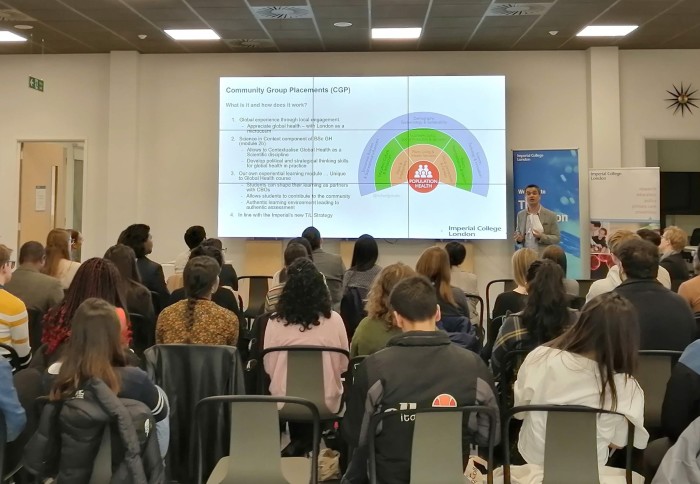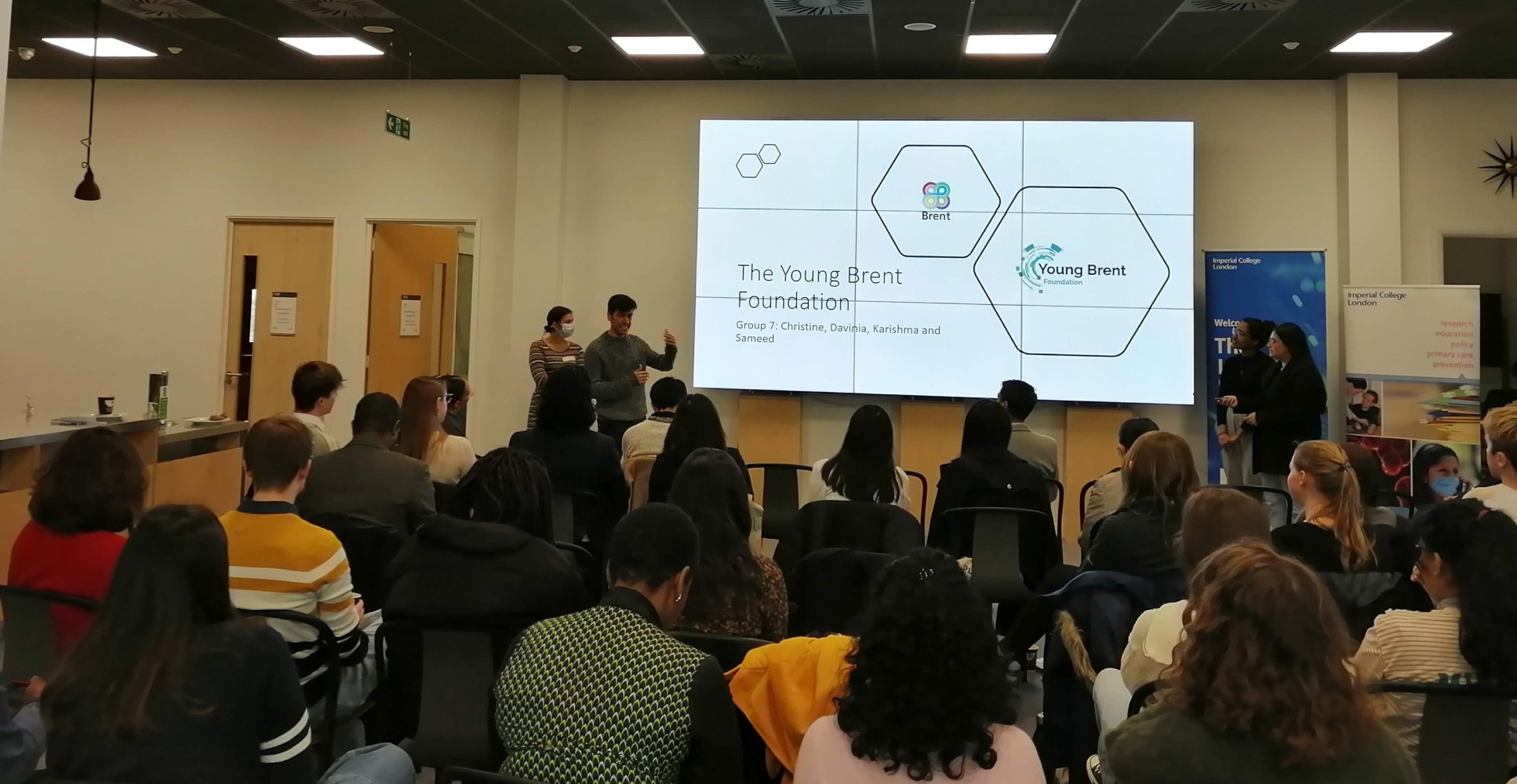Next generation of doctors work on global health issues with community groups
by Emily Govan

Global Health BSc students attend project showcase.
Medical and veterinary students from Imperial’s Global Health BSc course shared their community placement experiences at an exciting White City event.
The project showcase, on 29 April 2022, took place at the cutting-edge Invention Rooms, a space where College and the local community come together to innovate and collaborate.
As part of their Global Health BSc studies, students learn about global health and inequalities through collaborative work with local health and wellbeing voluntary sector organisations across London, lending their skills and time to effect change in their communities.
Each year these doctors of tomorrow report back and reflect on their experience of working with the their community partners and peers, showing how powerful collaboration with the voluntary sector can be. 36 students took part in this year’s project, working alongside eight different community groups.
The event was an opportunity to disseminate learnings, celebrate success and strengthen partnerships. It also highlighted how crucial it will be for the voluntary sector and the NHS to form closer partnerships in the future.
This year the community partners, which covered a range of diverse areas, were Addison Community Champions, FORWARD(Foundation for women’s health, research and development), Hammersmith Community Gardens Association, One Westminster, The Abbey Centre Community Association Limited, The Gurkha Centre, Young Brent Foundation and Young Hammersmith & Fulham Foundation.
Learning how to challenge inequalities
Community based organisations play an enormous role in supporting the health and wellbeing of communities all over the world. Dr Shyam Budhathoki BSc Global Health Coordinator
Dr Shyam Budhathoki, BSc Global Health Coordinator and Community Groups Placements Module Lead said: ‘Community based organisations play an enormous role in supporting the health and wellbeing of communities all over the world. So it's important our students get to see how these organisations work - as effective partners to health professionals and communities globally.
This is authentic learning that we can't replicate easily in the classroom: handling uncertainty, strategy and politics. It's great to see the relationship with our community partners grow. We think this can be a model for other programmes and we've a project already underway to share our learning.’
Dr Florence Mutlow, Personal Tutor, added: ‘As a doctor, I love how the placements have given the students appreciation for community, they will remember that and try and use the experience in their future practice. It’s really good to instil that importance of being connected as part of the community’.
One group of students was placed with the Young Brent Foundation, a charitable, independent voluntary sector body that works across public, private and voluntary sectors to support young people’s long-term mental health and wellbeing, particularly those from the BAME community.
The foundation plays a vital role in improving the health and wellbeing of the local population, especially those who may not access NHS services otherwise due to a variety of factors.
The students talked about the tensions they noticed between conventional health providers and community-based organisations (CBOs) - and the barriers to collaboration. They also reflected on funding dilemmas: that year-to-year grants as funding streams made predicting and planning for the future very challenging.

Karishma Dave, an Imperial medical student, said: ‘This placement provided a unique opportunity to see the wider impact that the work has on young people’s health. It highlighted gaps in the healthcare system to reaching everyone and how this might result in children slipping through the net. The placement also showed us, in regard to mental health, how to look at things holistically – rather than seeing individuals in the biomedical model, to instead see their background and how it impacts how health conditions present. It was a humbling experience’.
Another group was placed with the social prescribing team at OneWestminster, a multifaceted CBO working within the borough of Westminster.
The students discovered that more awareness was needed around the issue of social prescribing. There was a lack of engagement and GPs were not explaining to patients what to expect. The group recommended education of GPs and medical students, discharge summaries so that patients have a summary of their progress and information is stored safely, and a dedicated webpage to increase public awareness. Currently different social prescribers try to educate GPs in different ways; a standardised method which pools together resources may be more useful.
The students found there were challenges to incentivising GPs to invest and realised changes need to be made from the top, which will take time.
This placement really showed me the value of the voluntary sector and how it’s important to organise things so they are accessible to everybody. Safa Mushtaq, medical student
Safa Mushtaq, a medical student enrolled on the course this year from the University of East Anglia, said: ‘This placement really showed me the value of the voluntary sector and how it’s important to organise things so they are accessible to everybody. Community placements are important in medical school, it’s made me realise that each patient has their own situation and just prescribing them a medicine might not solve the situation they have. To get to the root of the problem you have to explore what’s going on in their lives and their social situation, it makes you step back and get the whole picture, treat every situation differently’.
Panel discussion – learnings from the pandemic
The afternoon was rounded off by a facilitated panel discussion, chaired by Dr Pinder, around how the pandemic has affected what community partners have been able to offer and how they have found new ways to engage with their communities whilst simultaneously dealing with the pressures of uncertainty and change.
Chris Murray, CEO of the Young Brent Foundation said: ‘It’s about being a good neighbour. We’ve tried to be the conduit and represented young people as best we could, we demonstrated that we could step into the space. We use a nugget of an idea, and then engage with local authorities and government. Cultural competency is so important, we have been speaking up more and getting plugged in’.
The panel also talked about any positives that can be taken forward from the pandemic. Chris said: ‘The organisations we work with are usually pressed for time, so it’s about understanding the power of using technology, Zoom, social media. We are building more relationships with the system’.
Dr Richard Pinder, the course director said: ‘The pandemic has shone a stark light on the inequalities and wellbeing challenges in northwest London and beyond. Our future clinicians have to better understand the voluntary and community sector as partners, who not only possess a deep understanding of the communities from which they draw but who will be an increasingly important element of the health and care ecosystem going forward.’
Article text (excluding photos or graphics) © Imperial College London.
Photos and graphics subject to third party copyright used with permission or © Imperial College London.
Reporter
Emily Govan
Department of Life Sciences